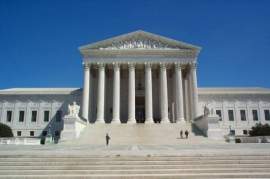
The Truth About The History of American Slave Trade

Popular In Constitution
Purpose Of Lifetime Appointment And Pros And Cons Enumerated Powers Bicameral Legislature Background Article 3 Of The Constitution We The People 1st Amendment Who Wrote The Constitution Judicial Review Equal Protection Clause 5th Amendment 10th Amendment Three Fifths Compromise
The notion of slavery and slave trade was a volatile issue during the process to ratify the Constitution of the United States. At the time, slave trade and labor was considered by many politicians and State leaders as a cornerstone of the economy of the United States. The usage of slave labor provided both economic and commercial benefits as a result of a general regard as slaves as subhuman workhorses. Both advocates and supporters of this practice deemed slaves as commodities and utilities, not as human beings, devoid of feelings, senses of self, and families.
At the time, slave trade was regarded in the same light as any other commercial practice. White traders arrived in Africa, seized the natives, and swiftly claimed ownership of them. Africans unjustly and cruelly seized as slaves and forced into slave trade were forced onto overcrowded ships and brought to the United States and essentially sold as commodities that provided free labor. The American slave trade contributed to the near-decimation of a culture, as well as the exploitation of millions of people, most of whom were ripped from their homes and families and subject to subhuman living and working conditions.
Over the course of the ratification process of the Constitution, slavery was a concern both on the part of its vehement detractors like Alexander Hamilton and John Adams, as well as its advocates such as the Representatives from Georgia and North Carolina. However, much like a definitive selection process for State representation, the ratification of the Constitution was contingent on a definitive Constitutional stance on slave trade. In particular, Georgia and North Carolina were immovable with their respective claim that slave trade was essential for their economy, unshakably so that they both refused to ratify the Constitution should slavery be abolished.
The discord that resulted from the debate over slavery prompted the authors of the Constitution to create a gag rule about the topic, which forbade any representative involved from discussing the subject. The gag rule established that slave trade could not and would not be discussed for twenty years after the ratification of the Constitution. Though many of the Founding Fathers were dissatisfied with the creation of the gag rule pertaining to the debate over slavery, they were confident that the ratification of the Constitution would provide a structural and humanistic platform from which abhorrent practices such as slavery could be abolished.
However, the gag rule did not render the results for which the Founding Fathers who were opposed to slave trade would have hoped. Only in 1865 after almost a century of the ratification of the Constitution, following the end of the Civil War, was slavery finally abolished with the passing of the Thirteenth Amendment of the Constitution.
Slavery is considered by most historians to be the single-most disgraceful, abhorrent, and vile practice in the history of the United States; a practice that displayed a general disregard and disrespect for human life. However, despite the popularity and purported need for slavery in the United States, there still existed progressive visionaries like John Adams who knew the extent of the dreadful practice. Adams is quoted as saying: “Consenting to slavery is a sacrilegious breach of trust, as offensive in the sight of God as it is derogatory from our own honor or interest of happiness.”
NEXT: Things to Know About the The Constitution





















